
THE BEST IS YET TO COME


THE BEST IS YET TO COME
Maryville named second fastest-growing private university as undergraduate enrollment hits an all-time high in the Fall 2022 semester.

Editor: Darla Ferrario
Design and Layout: Cisneros Design
Contributing Writers: Nancy Fowler, Tim Fox, Constance Gibbs, Pamela Kramer, Dale Singer, Gabbie St.
Contributing

Graphite Lab partners with Maryville to open a physical location on campus, bringing students opportunities for active learning and internships.
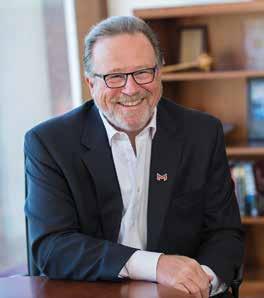
Celebrating 10 years of partnership, Rawlings Sport Business Management students are actively learning industry-relevant skills.
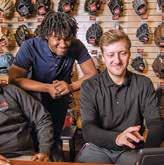
President: Mark Lombardi, PhD
Director, Strategic Marketing and Communications: Gabrielle Young
Executive Director, Development and Alumni Relations: Fay Fetick

Saints men’s and women’s soccer teams won the 2022 GLVC championship, marking the first conference win for the women’s team and the first time in GLVC history that one school has won both the men’s and women’s championships in the same year.
Maryville math professors use artificial intelligence to create a personalized learning model for students.
Dear Friends,
To reflect the wonderful activity of our 365-day University with students studying throughout the year, our magazines have changed to fall/winter and spring/summer.
This fall, we capped a yearlong celebration of our 150th anniversary at Homecoming weekend. The events of that weekend and the drone light show captured the mood and energy of celebration, pride, support and excitement about all that Maryville has achieved over the past 150 years.
This fall and into the winter, we blazed a trail of achievement, including GLVC soccer championships from our women’s and men’s teams. We reached the largest undergraduate enrollment — 5,711 — in our history and an overall enrollment of over 10,000. We were named the second-fastest growing private university in the nation by The Chronicle of Higher Education
Our students, faculty and staff continued their amazing record of achievement with research projects funded, books and articles published, and records broken. We launched the DeBaun Black Alumni Network in honor of Everlouis Rutledge DeBaun, ’58, the first African American to attend Maryville.
Dana Levin’s book of poetry Now Do You
Know Where You Are was named one of 100 books to read by The New York Times Our career success rate stands at 98% for the fifth consecutive year, meaning 98% of our graduates have jobs in their chosen field or are in graduate school within six months of graduation. And our St. Louis Speakers Series launched its 22nd year, while the Musial Awards sponsored by Maryville University went national on CBS. All of this and so much more is because of the passion, commitment and grit of our students, alumni, faculty and staff who do an amazing job each and every day. am proud of their work, and they are an inspiration to me every day.
I trust your holidays were happy and spent with family and friends, and look forward to 2023 and beyond as Maryville continues its vital work.
Thank you all for your generosity and good counsel.
Warmest regards,
PhD
Maryville University announced the largest undergraduate enrollment in its history for the Fall 2022 semester. The incoming class grew by 13% from 2021, and total undergraduate enrollment is continuing to grow beyond 5,800 students. Maryville’s total enrollment is well over 10,000, making Maryville the second fastest-growing private university in the nation.
President Mark Lombardi stated, “Our 98% career success rate, active learning ecosystem, numerous nationally ranked academic programs and our position as a top-10% wired campus in the U.S. all contribute to this unprecedented growth.”
Amid this enrollment growth, one major benefit for learners is stable tuition. Maryville froze tuition for five years and, in 2020, reduced tuition by 5%. Tuition fees are consistently increasing nationwide, on average, about 6.8% per year since 2017. This revolutionary approach to tuition has opened access and opportunity for thousands of learners across the nation.
“Programs like life coaching were started almost seven years ago as a tool to provide a unique advantage to our students early in their relationship with Maryville,” said Jennifer McCluskey, PhD,
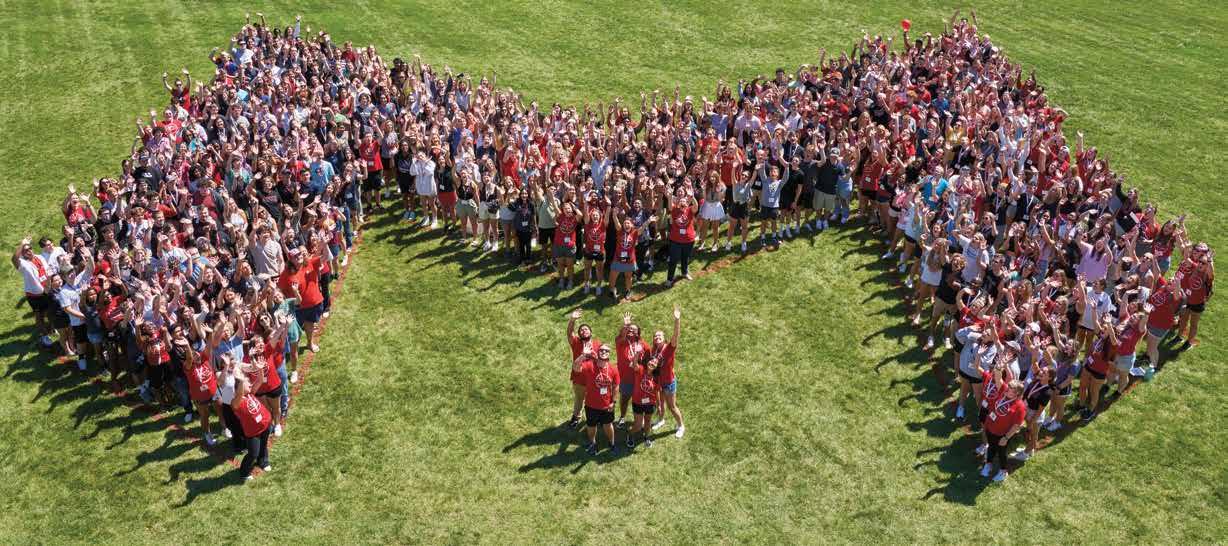

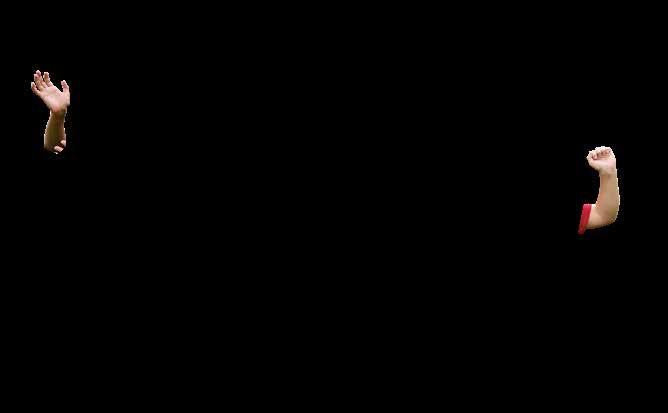
vice president for student success. “We are invested in ensuring that even before a learner shows up for their first day, we’re creating an environment of access and opportunity to help them understand and capitalize on their strengths. We’re in the business of giving our learners a competitive advantage as they work toward each milestone with us and in their professional careers.”
For 150 years, Maryville has worked to assess, evolve and innovate to meet learner needs. The emphasis on a digital-first
strategy has been integral in its recognition as an Apple Distinguished School for an unprecedented third time. This prestigious recognition is for innovation, leadership and excellence.
This enrollment milestone validates Maryville’s profound commitment to topquality affordable education with positive career outcomes for every learner. Maryville believes this revolutionary model of higher education works for St. Louis, the region and the nation.


With the celebration of Maryville’s 150th anniversary of its founding, the University launched a new recognition program called Maryville Forward for donors who make a leadership gift of $1,000 to the Maryville Fund. But Maryville Forward is more than a giving club; it is an opportunity to propel Maryville “forward” into the next 150 years.
For a limited time, a few dedicated donors have agreed to match gifts for first-time members. That’s how vital this new donor community is — moving Maryville forward to further growth while creating access and opportunity for students.
First-time gifts of $500 or more made to the Maryville Fund before May 31, 2023, will be matched to the $1,000 level of Maryville Forward. New donors will receive all the benefits of membership of Maryville Forward for the coming year, along with the peace of mind knowing their gifts will be used to immediately support students, programs and more. And for an added
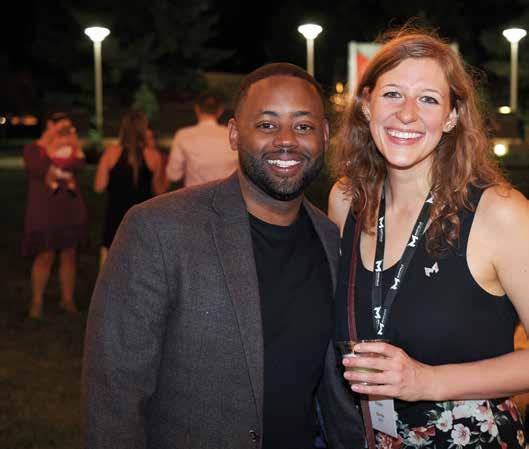
bonus, during this inaugural launch period, new donors will receive a one-of-a-kind commemorative coin signifying their status as a charter member.
Because gifts to the Maryville Fund provide the flexibility to meet current and future priorities of the University and to respond quickly to opportunities, Maryville Forward donors make a critical and lasting impact on the future of the University.

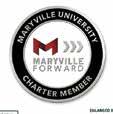
“Maryville Forward is a movement,” said President Mark Lombardi, PhD. “It represents the forward-thinking philosophy that led Maryville to become a pioneer in higher education and a dynamic national university providing access and opportunity for tens of thousands of students.”
The University anticipates unprecedented growth over the next few decades, and the support it receives via Maryville Forward will provide the resources to succeed. Maryville Forward members are part of the collective strength of the University community, and every member takes the University further into a future of success for our students. We’re moving Maryville Forward, together!
For everything from annual scholarships to emergency aid for students to ensuring graduates are marketready for an ever-changing workforce, the Maryville Fund helps ensure the well-being of Maryville students.
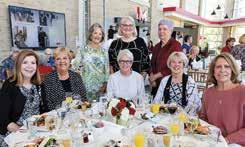
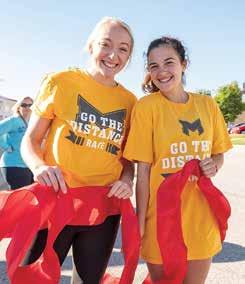

The Maryville community wrapped up our yearlong 150th anniversary celebration at Homecoming. It was an unforgettable opportunity to celebrate the past and toast to the future.
Hundreds of Maryville students, faculty, staff, alumni and friends attended Homecoming 2022. The weeklong celebration featured many favorite events with an anniversary twist. The Go the Distance Race was back and birthdaythemed with a cupcake celebration at the finish line followed by an all-new hilariously exciting cupcake relay pitting student teams against one another to see who could finish a cupcake and complete a lap around the track the fastest.
Another highlight of the week was the President’s Reception and Maryville Forward

Scan with your phone camera to watch the Drone Show from the 150th Celebration.
showcase. The evening concluded with a special grand finale to our 150th anniversary celebration with a drone show in the skies above the Academic Complex. Guests were overjoyed to watch their favorite Maryville memories appear as a group of illuminated, synchronized and choreographed drones arranged themselves into various formations, from the Donius University Center clock tower to our beloved mascot Louie to the #BigRedM.
Additionally, the celebration included the Fall 2022 Athletics Hall of Fame.
Congratulations to our honorees: past Maryville University President Claudius Pritchard, PhD; wrestler Nate Rodriguez; women’s volleyball player Dawn Robinson Smathers; and past Chief of Staff and Liaison to the Board of Trustees for Maryville’s Office of the President Kathy Lunan, recipient of the Lonnie Folks Award.
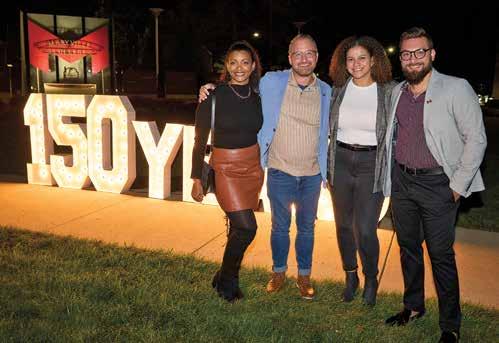
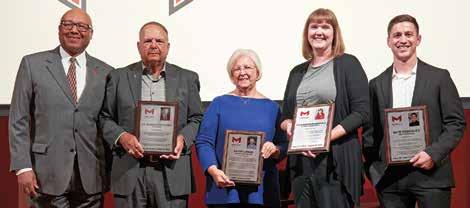
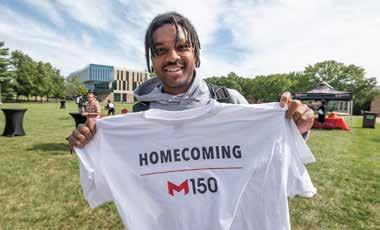

Maryville University: 150+ Years is available for purchase through

The M Store on campus or online.
Secure a copy of this limited-edition coffee-table book honoring Maryville’s rich and storied history. maryville.edu/ 150Book

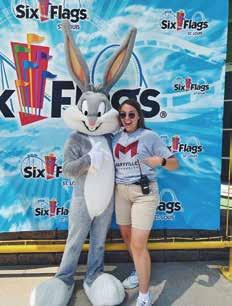
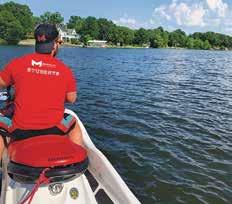








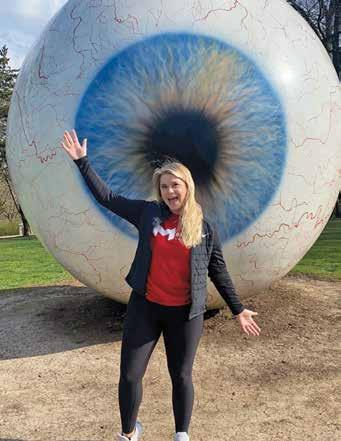
WHERE
Maryville recently hosted a social media contest asking followers to submit photos of themselves wearing Maryville spirit wear around the world. Submissions arrived from Jamaica, Honduras, the Swiss Alps and Belize, and favorite hometown spots such as Laumeier Sculpture Park and Six Flags St. Louis. Four winners received $100 Amazon gift cards in the categories of best vacation photo, best staycation photo, best photo while at work and funniest pose. Another 10 winners received $50 Starbucks gift cards for participation, courtesy of Maryville’s food service provider, Fresh Ideas.
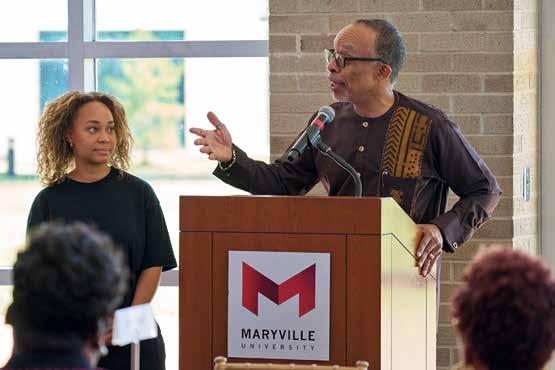
Michael DeBaun, MD, MPH, shares his pride for Maryville and our shared passion for increasing access and opportunity at the DeBaun Black Alumni Network Prayer Breakfast.

Maryville University is proud to announce the DeBaun Black Alumni Network, named after Everlouis Rutledge DeBaun, ’58, the first African American graduate of Maryville University.
The DeBaun Black Alumni Network will empower and provide support for current Black students through mentorship and scholarship as well as provide and promote opportunities for Black alumni to grow personal and professional networks.
“Everlouis Rutledge DeBaun forged a path for myriad students who have followed in her footsteps, creating the rich cultural fabric of today’s campus community,” said President Mark Lombardi, PhD. “Maryville is committed to expanding access and opportunity for all learners.
The DeBaun Black Alumni Network affirms the importance of our history and those who paved the way for an inclusive campus environment.”
After receiving her degree in Medical Technology in 1958, Everlouis worked in hospitals throughout the St. Louis area. She later attended Harris Teachers College and pursued a long career in education with St. Louis Public Schools. Her lifelong passion for learning and teaching inspired all three of her children to become educators.
“The naming of the Black Alumni Network after my mother acknowledges the challenges she faced and the triumphs she achieved during her lifetime,” said Michael DeBaun, MD, MPH, member of the Maryville University board of trustees and director of the Vanderbilt-Meharry Center for Excellence in Sickle Cell Disease.
“It’s my hope that the DeBaun Black Alumni Network will be a home base for Black students and alumni, so they thrive in their lives. May the group provide opportunities for jobs, internships and a social network that identifies the unique challenges that people of African descent face while living in America,” he said.
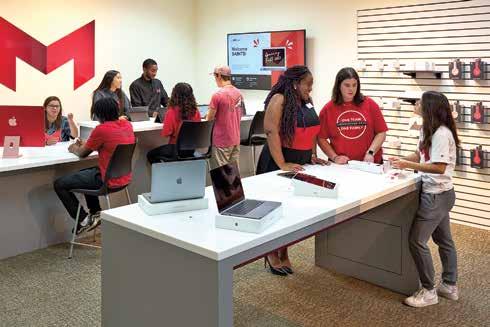
Maryville community members are increasing their digital expertise through the new MiTech Bar, located in The M Store.
Students, faculty and staff can stop by the new space for technology support services for their Apple products. The MiTech Bar will also offer a series of learning sessions to make using an Apple device easier, including sharing shortcuts, tips and tricks for some of Maryville’s core apps like RedShelf and Canvas.
Additionally, the MiTech Bar is an Apple authorized campus store. An array of Apple products are available for purchase, including Apple Watches, iPads, Macs, AirPods, and accessories such as charging cords and power adapters.
Purchasing products is the same as purchasing through the Apple Store. However, at the MiTech Bar, students can use financial aid dollars toward purchases, and faculty and staff can utilize payroll deduction.
“We’re excited to provide another opportunity that expands the learning and living community for our students. We believe this addition will heighten and elevate their learning journey,” said Nina Caldwell, EdD, vice president for student life. “We are thankful to the dedicated staff who continue to give their time and expertise to help our students learn the latest technology and digital literacy skills. We’re proud to put the students at the center of everything we do.”

As the digital revolution accelerates, the needs and expectations of Maryville’s learners, and the way they consume content, are profoundly shifting. We are at a crossroads in our conception of Information Technology. As a result, Maryville proudly announces the launch of The Office of the Digital Learner Experience (DLX). This new office is being redesigned with a laser focus on the learner’s educational and service journey.
This includes the new Digital Learner Experience (DLX) Technology Service Desk (formerly the IT Help Desk), which has moved from the lower level of Reid Hall to the second floor of the University Library. This new space allows more visibility and forward-facing opportunities with the University community. This new space is a second location for community members to access technology support services, in addition to the new MiTech Bar located in The M Store.

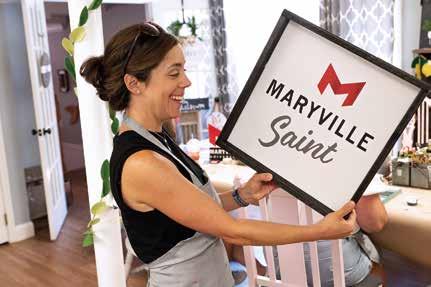
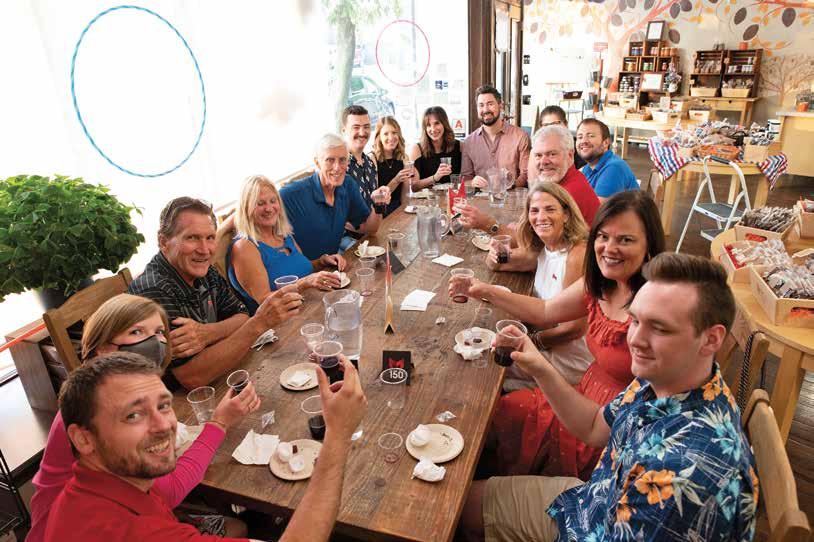

Maryville’s Alumni Summer Series offered a variety of activities for alumni to meet, socialize and learn. Events included a wine and chocolate tasting at Kakao Chocolate; crafting customized frames, charcuterie boards or door hangers on historic Main Street in St. Charles; and an exploration of Ryze Adventure Park, including climbing its one-of-a-kind adventure tower standing four stories tall. Alumni also had the opportunity to learn about the sport of curling and how to taste and compare coffees, giving them the confidence to conquer any cafe.

Families in North St. Louis now have a place to take children struggling with speech, thanks to the Walker Scottish Rite Clinic, a program of Maryville University.
The new satellite location opened in The Hub, a community resource center for residents in the Jeff-Vander-Lou neighborhood. The space features a speech therapy room and observation area, as well as a private waiting room. Staffed by certified speech therapists from the Walker Clinic, all families are welcome to receive services at no charge regardless of financial situation or insurance.
The Hub is an innovative, collaborative space bringing together agencies that provide a variety of services, including maternal health, banking, legal and social services. In September, St. Louis Mayor Tishaura O. Jones presented the Quality of Life Award to the Walker Clinic as one of the first four tenants in the building. The award honors those who demonstrate vision and leadership in expanding economic development within the City of St. Louis.


Following the release of her fifth book of poetry, Dana Levin, MA, distinguished writer-in-residence, is receiving national acclaim. The collection, Now Do You Know Where You Are, has earned rave reviews from NPR, the New Yorker and the Washington Post, as well as a coveted full-page write-up in the New York Times Levin wrote the poems between 2016 and 2020. It was a time of national upheaval — a polarizing president and a pandemic. It was also a time of personal transition; Levin left Santa Fe, her home of 19 years, for St. Louis and her position at Maryville. She’s hopeful the national praise for her book will highlight Maryville’s growing literary reputation. “I hope it helps people to understand Maryville University not only offers a superlative education but also has a thriving humanities presence,” Levin said.


The Maryville Summer Science and Robotics Camp returned to the Maryville campus this year for the first time since the pandemic’s start. The camp offers opportunities for students who are interested in science, technology, engineering and math (STEM) fields. Activities included using an Arduino board to program the words “Hello World” onto an LDC display. Another group created virtual reality worlds that they then immersed themselves in using Meta Quest 2 headsets. Other groups explored math and science connections to playgrounds using building sets and makerspace materials. To learn more about this and other Center for Access and Achievement programs, visit maryville.edu/CA2.

Associate Professor of Communication DUSTIN YORK, EdD, received a 4 Under 40 Emerging Leader Award from the American Marketing Association.
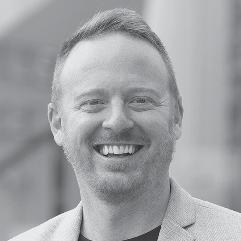
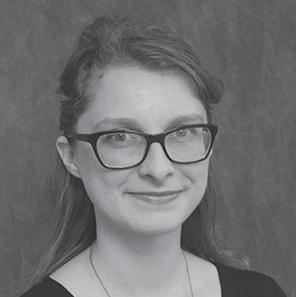
MARIEA SNELL, RN, FNP, associate professor of nursing and assistant director of the DNP Program, was inducted into the Fellows of the American Association of Nurse Practitioners (FAANP).
of Academic Success
ARETHA HARDRICK, EdD, was named a 2022 Young Leader by the St. Louis American Foundation.

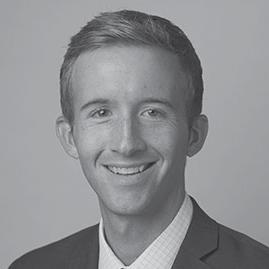
Assistant Professor of Accounting
BRETT ROUSSEAU was named a regional recipient of the 2022 Accreditation Council for Business Schools and Programs (ACBSP) Teaching Excellence Award.
Director of Career Success and Professional Development
ANTOINETTE BOYD, EdD, was featured by CNBC regarding why some employees who quit their jobs during the Great Resignation may regret their decision.
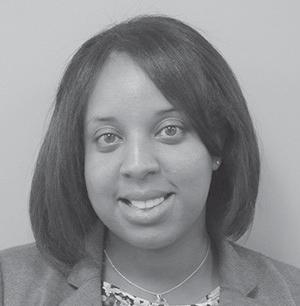

STEVE COXON, PhD executive director of Maryville’s Center for Access and Achievement and professor of education, was featured by the St. Louis Post-Dispatch regarding how educational experiences can be enjoyable and effective when delivered playfully.
Dean of the School of Adult and Online Education
KATHERINE LOUTHAN was featured by the Higher Ed Geek Podcast regarding Maryville’s commitment to affordable education with career outcomes for every learner.
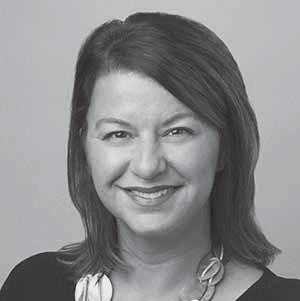
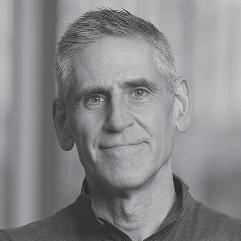
Chief Innovation Officer PHIL KOMARNY was featured by TechTarget about Maryville’s ongoing work to redesign traditional business processes using modern applications such as Salesforce, Slack and mobile apps.
Associate Professor of Nursing GAIL PITTROFF, RN, PhD, received a DAISY Award for Extraordinary Nurses.
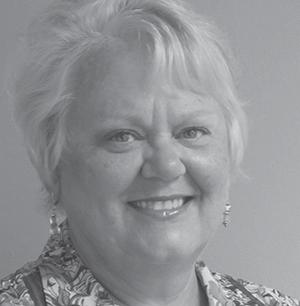
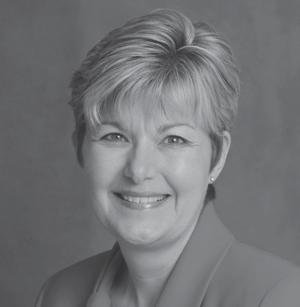
Human Resources Manager
TAMMIE LORDEN’s continued commitment to employee health and wellness earned Maryville a Making a Difference Gold Level Aetna Workplace Wellbeing Award.
On-campus development studio opens up innovative internship opportunities
BY NANCY FOWLER
In 2019, Maryville game design professor Matt Raithel hoped to place yet another promising student in a paid internship with his game development company, Graphite Lab. But the office was nearly 10 miles from campus.
Transportation issues prevented the student from taking advantage of the opportunity.
Roadblocks were the last thing Raithel wanted for students of Maryville’s growing game design program.
“What we hoped for was to offer more internships more often for more students,” Raithel said.
Then came the pandemic. Graphite Lab closed its brick-and-mortar facilities and began functioning as a strictly virtual operation. All internships were conducted online. But as the pandemic eased, Raithel wondered: What if he set up a physical location on campus?
Maryville University administration quickly greenlighted the idea. This fall, Graphite Lab opened in Reid Hall, giving students access to innovative internships on campus.
“It’s incredibly unique that students can walk down the hallway and see an operating software development company that’s producing hits for Atari, Cartoon Network, Hasbro, Disney and other companies of that caliber,” Raithel said.

Maryville provides the space and Graphite Lab provides computers, network infrastructure, furniture and other necessities. Student interns can participate in every phase of game development, including art, music and sound design; programming; storytelling; product management; and quality assurance testing. Their names appear on the list of credits for games they work on, which is attractive to future employers, Raithel said.
“It shows they know not just how to get a grade but how to work in a team, how to hit a deadline, how to troubleshoot and how
to get feedback from the team — all on a regular basis,” he said.
Developing and troubleshooting games involves collaborating online with others around the country. The beauty of the on-campus location is students also share personal interactions with local Graphite Lab employees, including several Maryville alums, as well as Raithel himself. The skills they hone in this process prepare them for game design careers and beyond.
One game design graduate used their skills as an app design consultant for a major retail brand. Others have built augmented and virtual reality experiences for companies like TOMY and Bayer.
“People think, ‘Oh, games — you must be working on Mario stuff,’” Raithel said. “But you can apply these skills to tons of different industries.”
Graphite Lab intern Matthew Sinclair, a fourth-year student, grew up playing video games but never thought he’d work in the field. He came to Maryville as an English major, but after discovering the game design curriculum, he was hooked. Now the working student nearing the end of a sixyear graduation plan says he probably would have left college if not for the program.
Sinclair said the physical, in-person experience of performing quality assurance for Graphite Lab has helped demystify the world of professional game development.
“I used to wonder, ‘What does a game designer do? What tools do they work with? Are they sitting at a corkboard with red strings and sticky notes?’” Sinclair said. “I’m going to come out of this with a solid idea about what I’ll be doing in the future that I don’t think I would have otherwise.”
As a commuter student who lives nearly half an hour from campus, Sinclair appreciates having to make just one drive for class and his internship.
“It definitely saves me some money on gas,” he said.
Fourth-year student
Gabrielle Richards also likes the convenience of the on-campus studio. The art designer also enjoys the combination of in-person and remote interaction.
“Every Monday we have a team meeting where we might say, ‘This is what I worked on last week; this is what I plan to do this week,’” Richards said. “It’s fun seeing how a real workday goes.”
Raithel hopes having the on-campus location will triple the number of student internships hosted by Graphite Lab this year. But its value goes even beyond increased internships within the borders of the classroom-sized space, he said. It’s also helping Maryville create an entire tech corridor, which includes the Rawlings Sport Business Management facilities and Cyber Fusion Center.
“If you pass through Reid Hall while walking from Admissions to the Design and Visual Art building, you can literally see Maryville’s commitment to professional experiences with tech and innovation,” Raithel said. “I believe having unique access to these active learning opportunities on campus will translate to stronger, more prepared graduates.”

Professor Jesse Kavadlo, a world-renowned scholar of American novelist Don DeLillo, shares DeLillo’s works with Maryville students and recently published a book about the author with the prestigious Cambridge University Press. BY DALE SINGER
Jesse Kavadlo, PhD, tells his literature students at Maryville that Don DeLillo may be the most famous writer they’ve never heard of.
With his second book about DeLillo coming out, Kavadlo is doing his part to correct that notion.
Kavadlo, professor of English and humanities, has taught at Maryville since 2004. He teaches all levels of American literature and is beloved for his popular culture courses about monsters, superheroes, conspiracies, and rock and roll, among other topics.
But Kavadlo is also a longtime student of DeLillo. His PhD thesis at Fordham University was published as a book, titled Don DeLillo: Balance at the Edge of Belief Now, he has edited a second book, Don DeLillo In Context, published by Cambridge University Press.
Kavadlo said he hadn’t planned to do a second DeLillo book, but he was drawn in anyway. “As he kept publishing and he kept writing,” Kavadlo said, “I found that I had more to say.”
That fascination began with Kavadlo’s first experience with the DeLillo canon, the novel
White Noise which won the National Book Award in 1985. It is about an academic year in a small American college town that is struck by a toxic environmental event.
“I felt like it was speaking to me,” he said. “It has a sense of humor, a sense of existential dread, along with a satire of higher education.”
After all these years, Kavadlo said that book is still his favorite; he’s read it about a dozen times and teaches it regularly — not always to rave reviews from his students.
“The class is always a little bit mixed on it,” he said. “I think it’s an important one for them to read. But it’s also a really good exercise for them to see how all these sentences work and how DeLillo really pulls it off. The voice is very powerful and well written.”
Besides experiencing DeLillo with his Maryville students, Kavadlo is recognized internationally for his knowledge of the author. He recently traveled to Spain to take part in the defense of a PhD thesis by a student there. The defense was hosted by the University of Alcalá, located outside of Madrid. Looking at DeLillo from a different point of view was a fascinating and instructive experience, Kavadlo said,
Though the term “postmodern” has been used many times to describe the DeLillo canon, the author himself distances himself from the label, saying he considers himself part of a long line of modernists, from Joyce through Faulkner and so on. Kavadlo has a broader view.
“Sometimes it can be helpful to try to understand DeLillo in terms of a genre,” he said, “even though with some of his earlier novels, he played around with them. But they’re postmodern in that he was aware of those genres. He’s quite different from some of the other writers who are in those categories.
and something that will benefit his future teachings of the author’s work.
“The way this student approached it was different from the way Americans do,” he explained. “She focused on his Americanness, with an interesting outside perspective, about reading it in English then looking at Spanish translations, and about how some ways the translations are complicated because of how he is interested in language and ambiguity.”
As president of the Don DeLillo Society, Kavadlo has kept up with the author, who continues to publish novels but whose prose has become more concentrated.
“As he’s getting older, since the novel Underworld he’s gotten very stripped down and more cryptic in his writing,” Kavadlo said, “and the humor has gotten ice cold. It’s a little tricky. He’s being more ascetic in his writing, and that takes more from the reader. I find myself reading him and giving him the benefit of the doubt over time.”
Not that DeLillo is detached from modern American tastes. Kavadlo said he can find DeLillo influences in such disparate popular culture fare as Lost and Mad Men, as well as in a new film adaptation of White Noise
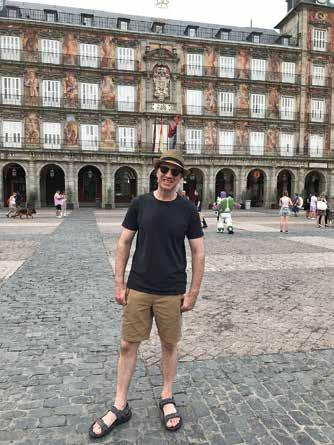
“A word used a lot with DeLillo is ‘prescient.’ He was ahead of his time, but at same time, very historical-thinking and backwards-looking at the Cold War and the Kennedy assassination.”
Kavadlo feels DeLillo’s readership is likely to grow, in terms of popularity and appreciation.
“I definitely think he’s going to continue to be read in the far future,” he said. “The worst case is that he’s studied as a historical figure. I hope it’s not just that. I hope people read him because he gives us a very interesting window into the way things were and continue to be.”
In terms of his own publication, Kavadlo, who also directs Maryville’s Dr. Mary Ellen Finch Center for Teaching and Learning, emphasized how significant it is for a member of the University’s faculty to have a book published by the prestigious Cambridge University Press.
“Publishing a book like this with Cambridge is a big deal for me,” he said. “Maryville’s faculty does significant research in their disciplines and fields. This is an important part of our faculty identity as well as our student-centered learning.”
Jesse Kavadlo, PhD, professor of English and humanities, is recognized internationally for his knowledge of author Don DeLillo. He recently traveled to Spain to take part in the defense of a student’s PhD thesis on DeLillo and edited a book published by Cambridge University Press on the author.

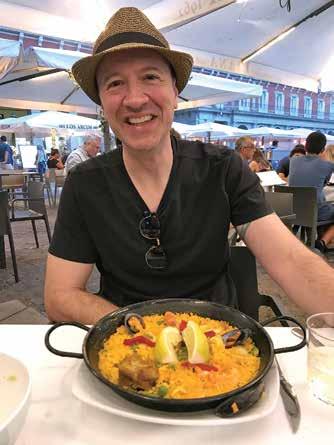


Maryville University’s Rawlings Sport Business Management program celebrates 10 years of partnership with Rawlings Sporting Goods.
BY
Ifa strong partnership is defined as including the exchange of meaningful knowledge, shared goals and a strong element of mutual benefit, then the Rawlings Sport Business Management program is a prime example.
In 2008, the sport business management program at Maryville University was established as part of the John E. Simon School of Business. But in 2013, the program made a change that would significantly impact its current and future students: it became the Rawlings Sport Business Management (RSBM) program, the first corporately named sport business management program in the country.
The partnership between the program and Rawlings wasn’t born overnight. Years before anything became official, Jason Williams, EdD, program director and assistant dean of the John E. Simon School of Business, put into practice what is taught to the program’s students: make connections and take chances. Williams met with a senior vice president at Rawlings and asked, “What may our students be able to help with that you don’t have the time or resources for as an organization?”
This question paved the way for a strong, multi-layered partnership with Rawlings. At the time, the sporting goods company was getting into the football helmet business. So Williams sent over a list of football coaches he knew and began conducting research for them. From there, the relationship grew. Rawlings was the official internship provider for a collegiate football allstar game, and they asked the sport business management program to provide them with interns for the event, marking the beginning of many similar opportunities to come.
In 2013, Maryville and Rawlings made things official: the program became the Rawlings Sport Business Management program. The partnership was celebrated with a ceremony at Busch Stadium, with St. Louis Cardinals President William DeWitt III in attendance.
“We are excited to see two of our great partners joining forces to prepare the next generation of sport business leaders,” DeWitt said of the partnership.
“We began working together simply by doing things that helped each other’s business,” Williams said. “A decade later, we’re still providing high-quality research assistance to Rawlings as well as volunteers and interns, and they continue to work closely with our students to help them develop jobready skills and professionalism.”
“The sport business industry is our classroom. As the work becomes more complex in this rapidly changing marketplace, our students consistently step up to the plate and hit home runs.”

Today, the partnership is stronger than ever: some Rawlings executives are adjunct professors in the program, and others are guest speakers for classes. They offer career development opportunities, including internships specifically developed for Maryville students. They also provide gear and equipment for the University’s softball and baseball programs.
But the partnership isn’t just beneficial for Maryville and its RSBM students — it’s mutually beneficial. In addition to research projects and internships, fourth-year students present marketing projects to executives at Rawlings with recommendations for enhancing their brand presence in the marketplace each year. Countless Maryville students have interned with Rawlings over the past 10 years, with many hired full time after graduation.
“Rawlings has benefited from our strong partnership with Maryville in myriad ways, from receiving professional-level product and brand research and invaluable support at industry events to having direct access to the most talented students for internship and full-time positions,” said Ron Ostrowski, president of Rawlings.
For prospective students, the named program has made a difference when researching schools and sport business programs.
“There were other sport business programs I was looking into, but having the Rawlings name attached to Maryville’s program made it stand out,” said Russell Susuki, ’18. “Knowing how closely they work together on partnerships and opportunities for students really gave the program a higher level of appeal for me.”
Susuki’s first introduction to the program came via the Rawlings Sport Business Management Summer Institute. The weeklong summer program gives prospective students an inside look at the program and Maryville. Participants spend a day each with program partners like Rawlings, the Missouri Valley Conference, the St. Louis Sports Commission and the St. Louis Cardinals.
“It was a great opportunity for me to learn about and be introduced to the sport business industry, the program and Maryville in general,” Susuki said. “Seeing their partnerships was impressive to me, and the
The RSBM program prides itself on its connections. In addition to the strong partnership with its namesake, Williams and program faculty have developed relationships with other organizations in the sports industry — like the Missouri Valley Conference, the St. Louis Cardinals, Peak Sports, Anheuser-Busch and many other industry organizations.
“The sport business industry is our classroom,” Williams said. Through these partnerships, there are countless opportunities for RSBM students to volunteer and intern while earning their degree. This year alone, RSBM students had more than 50 volunteer opportunities within the sports industry.
“Organizations across the country know about the program and the high quality of its students and graduates,” Susuki said.
“They know that Maryville graduates will be prepared to work in the sports industry and will be well-rounded professionals.”
Williams’ goal for the future of the program is to continuously change as the industry changes so that its students graduate with industry-relevant skills. “We want to build even more opportunities and connections for our students to help them build those skills,” he said.
idea of interning or possibly working for Rawlings was exciting.”
If you ask program alum Lucas Winkelmann, ’18, if the Rawlings partnership made an impact on his decision to enroll in the program, the answer is a resounding yes. “I didn’t think a company like Rawlings would put their name on a program that didn’t deserve it,” he said. “It adds a lot of credibility to the program.”
For Winkelmann, the impact of the Rawlings partnership has been instrumental to both his education and career path. He began as an intern at Rawlings during his time as a student in the program. Now, Winkelmann is an associate national account manager in the ecommerce division at Rawlings.
“As an intern, I learned a lot about their culture and their day-to-day work,” he said. “I was able to make connections with employees who were able to speak on my behalf when I applied for a full-time position at Rawlings.”
During his time as a student, Winkelmann had the opportunity to speak to prospective high school students about the RSBM program. “I could see it in their faces and their parents’ faces that the program being sponsored carries a lot of weight.”
For alum Shelby Hild, ’15, the experience she gained through the RSBM program is invaluable. “As a 19-year-old, I had so much experience in the industry,” she said. “I felt like I had a leg up on other job candidates who didn’t have that type of experience upon graduating.”
Fourth-year student Donnie Fox, who has had five different internships throughout his time in the program, agrees. “From the volunteer opportunities provided through the program, you build your resume up and become a really attractive intern candidate,” he said. “It makes you competitive.”
The program has gained a solid industry reputation, and not just among prospective or current students.
In reflecting on the first 10 years of the Rawlings partnership, Williams is most proud of building something between three special entities: Maryville University, Rawlings and the sport business management program. Through their partnership, each is better than they are on their own.
“It’s truly a partnership where both organizations benefit, and most importantly, so do our students,” said Williams. Ostrowski added, “We’ve accomplished so much together over the past 10 years, and we’re looking forward to the program’s continued growth and success for years to come.”
In honor of the 10-year anniversary, the program will celebrate with a special event at Busch Stadium in the spring.

of May 2022 graduates from the Rawlings Sport Business Management program started jobs in the industry within four months of graduation 96%
1,650+ hours of experiential learning outside of St. Louis
6,700+ hours of work experience at internships 38 completed internships
100+ combined years of experience in the field
BY CONSTANCE GIBBS
AThe Interdisciplinary Feeding and Swallowing Team at Maryville University provides evaluation of and intervention for pediatric feeding and swallowing disorders at no cost.
group of friends sits at a table with the colorful game Candy Land ready to play in the center. To the side, a kid-friendly fruit plate is arranged, including red grapes, clementines, blueberries, apple slices and Oreo cookie sticks and cream dip. Today, the delicioussounding destinations and sweet adventures are a gateway to introduce new food flavors and textures to a 4-year-old boy named Aaron.
“All right, friend, what color are you going to be?” asks Sara B. Grzina, MHS, CCC-SLP, assistant professor of speechlanguage pathology. Aaron proudly exclaims, “Red!” before picking which colored gingerbread pawns the other friends will be. Grzina draws the first card from the pile: a single blue square that represents the challenge to bite a grape. “Do you think I can make teeth marks?” she asks Aaron. She takes a bite and shows off her handiwork. The group claps and cheers. The next player draws a double purple card that represents the challenge to lick a cookie stick. “But first you have to smell it!” says Aaron. “I’ll do it at the same time! Let’s all do it at the same time,” he says. Leading the group, Aaron smells the cookie, touches it to his lips, licks the top and then bites a small nibble. “What do you think?” Grzina asks. “Good!” he exclaims. A few weeks ago, Aaron only ate traditional Oreos and would not even touch a cookie stick.

Today’s round of Candy Land and its creative food challenges is part of the Interdisciplinary Feeding and Swallowing Team at Maryville University. The team provides evaluation of and intervention for pediatric feeding and swallowing disorders at no cost. The program is a collaboration between Maryville’s Speech-Language Pathology and Occupational Therapy programs, two health professions that often work together across hospital-based and outpatient settings.
A pediatric feeding disorder is defined as impaired oral intake that is not age-appropriate and is associated with medical, nutritional, feeding skill and/or psychosocial dysfunction.
Up to 25% of typically developing children and up to 80% of children with developmental disabilities experience feeding and swallowing disorders. Symptoms can include long mealtimes; avoidance or refusal of foods; poor weight gain; and gagging, coughing, choking or vomiting while eating.
The Maryville team leads therapy sessions in person and via telehealth, depending on
the needs of each child. Sessions include interactive activities, like Candy Land and shaving cream painting, to food-based play like making pancake faces from fruit, sprinkles and chocolate chips. Like many children with swallowing and feeding disorders, Aaron, who has autism, has a limited food repertoire. He eats approximately 10 foods, including one brand of chicken nuggets and dry foods such as fruit cereal and potato chips. His sensory food aversions and texture preferences prevent him from eating fruits and vegetables and taking medicines and multivitamins. Adults often overlook the challenges associated with certain foods, such as eating fresh blueberries. Depending on the season, they can be sweet or sour, or crunchy or soft. Another barrier is that many adults were raised to be part of the “Clean Plate Club,” which created complicated relationships with food.
“When I say my son is a picky eater, a lot of people misunderstand and think it’s a choice,” said Christy White, Aaron’s mother.
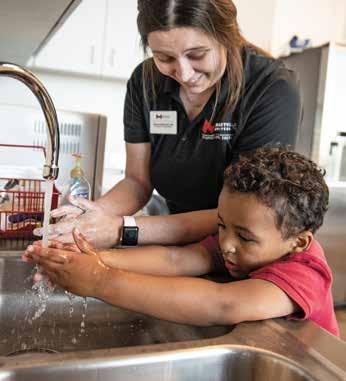
“But eating is a very scary thing for him. The program has been amazing because they really want him to succeed and have customized therapies just for him. They’ve created an environment that is low-risk and comfortable to take away the scariness.”
Swallowing and feeding disorders also place significant stress on the rest of the family, not just the child. Parents may cook multiple foods for a single meal, and parents and children may not eat meals together. Many parents have experienced the frustration of begging, bribing and forcing a child to eat just one bite of something. While the Maryville team focuses first on feeding and swallowing with the child, another significant part of their work is supporting and educating parents to carry over newly learned strategies into the home.
“It’s been helpful for me to observe the team interacting with Aaron, like how they redirect him when he’s off task, so I can use those tips and tricks at home,” White said. “Before the program, Aaron wouldn’t even touch foods
We’re hoping our program opens doors for students and gives them experience on their resume that sets them apart from other candidates. It’s a safe environment to practice conversations, which builds confidence for young professionals.

like grapes or clementines. So, the fact that he’s now able to lick and bite these foods is wonderful. We’re really thankful.”
One goal of the Maryville team is early intervention and addressing problems during toddlerhood and early childhood.
“The earlier we can intervene, the better the prognosis and the faster progress will be made,” said Michelle Scott, MOT, OTR/L, ’14, assistant professor of occupational therapy. “Feeding and swallowing impact things like attention, sleep and behavior. Eating is also a large part of our life and social interactions. It can affect how a child participates in lunch at school with friends, to their nutrition and hydration and therefore their growth and development.”
Maryville University students assist with the program during all stages, from the moment a child walks through the door to the day they graduate from therapy. Responsibilities include conducting feeding evaluations, planning therapy sessions, participating in those sessions and practicing
documentation. Students from both occupational therapy and speech-language pathology are invited to participate.
“It’s a unique and exciting opportunity for students because it’s unusual to receive any type of feeding and swallowing experience while in a university setting,”
Grzina said. “Traditionally, students don’t get that experience until they participate in externships or fieldwork assignments. Our students are learning how to support children and families before they go out into the community, and they’re gaining real-world experiences that are preparing them for future careers.”
The feeding and swallowing experience is crucial for students who seek pediatric positions, which are highly desired and difficult to secure. “We’re hoping our program opens doors for students and gives them experience on their resume that sets them apart from other candidates,” Grzina said. Additionally, Maryville students benefit from the interprofessional collaboration
modeled by faculty throughout the program. They have the opportunity to work together and learn more about each other’s disciplines, and what every health professional brings to the table, to improve the quality of care for children and families. “It’s a safe environment to practice conversations, which builds confidence for young professionals,” Grzina said, “so that they feel less intimated when they go out on their own.”
Jaelynn Hunnicutt, who is studying occupational therapy, discovered her passion for feeding and swallowing disorders after supporting her little brother. Hunnicutt has enjoyed working with Aaron because he reminds her of her brother and how feeding therapy changed his life.
“Seeing Aaron’s progress in such a short time is super rewarding,” Hunnicutt said.
“I love that he’s always excited to do whatever we have planned. He always pushes himself, and some of the work we do is pretty hard
work. I love watching him work through obstacles and achieve something new.” Hunnicutt plans to pursue a career in pediatric feeding after graduation because of her experiences. She chose to attend Maryville because of the University’s Freshman Direct Entry Occupational Therapy program, which combines an undergraduate and graduate education with rigorous training in the field. “The feeding and swallowing team is an opportunity I typically wouldn’t get, and the clinical experience I’m gaining is incomparable,” she said.
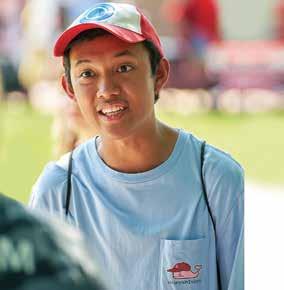

Maryville students are as likely to be found harvesting lettuce, visiting neglected neighborhoods and creating children’s literature as they are to be learning about biology, social justice and composition in a classroom. It’s all part of the University’s focus on experiential and individualized education.
In 2014, Maryville launched an Active Learning Ecosystem (ALE) initiative, which includes experimenting with cutting-edge technology, supporting intellectual risk-taking and conducting ongoing assessment.
This past spring and summer, students rated a variety of ALE activities — from a Shark Tank-style business presentation to an Instagrammable writing assignment — on their level of engagement. Their positive responses help tell the story of the deep immersion and collaboration that makes Maryville unique.
the sites that were created offered the chance to create custom wheels, view furniture in augmented reality, or personalize beauty products. In another nod to the show, student “investors” would pretend they each had $1 million to bestow on one or more potential businesses.
In impromptu presentations, students touted their design choices and the research and rationale behind them. They emphasized their selling strategies and target audiences.
“They couldn’t just stand up there and show their work,” Smith said. “They really had to sell it and explain themselves.”
For example, a student might point out they chose the color purple because it was unique; nothing else in their particular industry is purple. Would-be investors had to consider not only the immediate appeal of the product but also its future money-making potential. Even if they weren’t fully sold on an idea, students offered valuable responses.
Students give rave reviews to active learning projects that illustrate the Maryville experience
BY NANCY FOWLER

Kelly Smith, ’13, an instructor of interactive design, wanted students to give each other better-quality feedback on their ecommerce businesses.
“I wondered, ‘If theirs were real businesses, what would they do?’” Smith said.
Smith thought up an idea based on Shark Tank the popular TV series in which entrepreneurs present their ideas to potential investors. The products were interactive websites that the students designed. Some of
“The feedback might be, ‘I can see strong work, it just needs a bit of tweaking,’” Smith said.
Students gave the activity a four out of five. To enhance her next Shark Tank assignment, Smith decided to introduce the idea earlier in the semester. “So when they do their presentations, they’re a little more prepared,” she said.
Smith believes students evaluating ALE projects is an important step in the continued development of the initiative.
“An idea for an ALE activity may look flashy or cool,” Smith said. “But what does the actual data suggest? What are the real-life outcomes?”
“An idea for an ALE activity may look flashy or cool, but what does the actual data suggest? What are the real-life outcomes?”
Chemistry professor Natalie Ulrich challenged her organic chemistry students to work with a tech tool typically employed not by scientists but designers. In a collaborative project, they used a virtual whiteboard called MURAL to create a brandnew molecule in five steps. It was a complex task calling upon 16 weeks of classwork, Ulrich said. She was curious: Would her second-year students be able to complete an activity more suited to graduate work?
Watching 22 students in small groups, Ulrich held off from jumping in even when she sensed frustration. As they forged through their issues, the energy was palpable, Ulrich said.
“They were talking to each other and looking through all their notes,” she said. “Pretty much 100% engagement, which is not really typical for a traditional organic chemistry classroom.”
Their collaborations paid off. Each group was able to move on to the next phase in which Ulrich asked students to remove some of the five steps from their process. The result was a puzzle with missing pieces for others to solve, creating a lesson in teaching
techniques. A final task was providing feedback and implementing it to improve their work.
Students gave the exercise a five out of five. They reported a better understanding of molecule synthesis and a boost in selfconfidence. They all surprised themselves by completing what at first seemed a daunting task.
Maryville students have now come to expect immersive activities in all their classes, according to Ulrich. She said active learning not only facilitates better retention, it also strengthens broader abilities.
“It helps students develop skills in communication, critical thinking and leadership,” Ulrich said. “Which are probably as important as anything they learn about chemistry.”
Humanities instructor Christi Branson wanted to encourage her first-year composition students to consider their audiences. She used a vehicle not usually associated with a writing assignment: Instagram.
First, students developed research questions. For example, one wanted to know how music therapy could benefit people dealing with a mental health challenge. As they researched their questions, Branson asked the students to imagine an audience, find images to go along with their research and present their results in the form of Instagram posts. “I would call it a new genre of English Comp,” Branson said.
As a final step, the students worked in groups of three to review and discuss each other’s work.
“It made for productive, collaborative conversations, which helps give them more confidence to work in a group,” Branson said. The students gave the activity a five out of five. Branson took a photo of the class during the process that illustrates their high level of engagement.
“It definitely shows in all the smiles and their body language,” Branson said. “They were all turning toward each other.”
Erin Boswell, ’07, director of new student and first-year experience programs, trains student leaders, including resident assistants and peer mentors, how to welcome incoming students. This past summer, she came up with an activity to help them think of new students as customers.
Boswell divided the student leaders into groups of six. She presented each group with a case study illustrating an issue they might face. One example was a parent upset over their child’s mirror being broken during move-in. The goal was for the members of each group to come to a consensus about how to handle their situation.

“It gave us a chance to talk about how there’s not necessarily a right way or wrong way to solve a problem,” Boswell said.
Each group had to come up with five action steps for resolving the issues in their case studies.
“What I really liked is most of them started with an apology as their first step,” Boswell said.
Student leaders rated the activity a four out of five, saying they wanted to add even more case studies to the training, which Boswell plans to do this coming summer.
Boswell said the case-studies activity encouraged students to consider the views of others as well as their own when problemsolving. She said the concept has implications that resonate far beyond the classroom.
“Problem-solving is a goal we set for ALE, but it’s more than that,” Branson said. “The ability to solve problems is also something we want all our students to have before they leave Maryville.”

BY DALE SINGER
Mathematics professors at Maryville are making the most of students’ time by helping them progress with a personalized learning model utilizing artificial intelligence. Math at Your Own Pace, piloted in the spring of 2022, is designed and co-taught by Dushanthi Herath, PhD, and Sharmila Sivalingam, PhD, assistant professors of mathematics. The classroom utilizes tools like the AI system ALEKS, which tracks student success, customizes their learning and allows them to work at their own speed.
Herath and Sivalingam, with guidance from Jennifer Yukna, PhD, vice president for academic affairs, modeled this flexible enrollment experience where students earn credit for either Math 117 or Math 125 based on their individual mastery. Students attend the same class, but each pursues a unique, personalized path to their success shaped by artificial intelligence tools.
Sivalingam explained, “Historically, students either register for Math 117 (College Algebra) or Math 125 (College Algebra and Trigonometry). The prerequisite assessment is the same for both courses, but Math 125 is faster-paced and covers additional trigonometric content. From our experience, students underperforming in Math 125 may perform better in the slower-paced Math 117. On the other hand, students breezing through Math 117 may benefit from the challenge of completing Math 125.”
One tool helping to provide students a personalized in-class experience is ALEKS, an adaptive courseware that uses artificial intelligence to measure and set the mastery level in the student’s learning journey. Using weekly assessments, ALEKS maps coursework mastery and continuously offers each student a selection of only the topics they are individually ready to learn at the current time. This builds student confidence and learning momentum.
“None of us learn at the same pace,” said Sivalingam. “So, we started working on a personalized learning model enhanced by artificial intelligence where students can work at their own pace in the same classroom, but on two different courses. The courses are coordinated, meaning that they have continuous progress from one course to the other.”
Herath added: “In a traditional setting, the course is fixed. If you learn it, that’s it. If you don’t learn it, that’s it. It can be a struggle. With ALEKS, students can solve a problem, and if they make a mistake, they can go through the steps carefully and learn how to solve the problem. Also, they can try out another similar problem. It helps them practice and learn to solve a problem at their own pace.”
“The students are really focused,” she explained. “I have students telling me this semester that they love this model, and they like coming to this class.”
Claire Burmester, a first-year nursing student, is among those who like the system. She finds ALEKS unique in the way it helps students make their way through problems like complex fractions and negative square roots.
“If you miss an answer, it can show you where you took a wrong turn,” she said. “If you get it right, you get the credit and move along. If you need more help, the teacher is there, but if you don’t, you proceed at your own pace.”
“It makes learning easier,” Burmester said. “Sometimes, students are scared to ask a question in front of the class. This is kind of like always having a teacher there to explain what you did wrong.” If a fellow student asks Burmeister whether taking a course enhanced with artificial intelligence is a good idea, her reply is quick and sure: “Definitely.”
Sivalingam and Herath provide training and support for fellow faculty and are collecting data to analyze the impact of the model on student achievement.
“We are going beyond just measuring
success based on student evaluation comments,” Sivalingam explained. “We are currently comparing semester results with traditional courses to quantify the impact of this artificial intelligence. As a second part of the research, we will compare one year to one-and-a-half years to better understand how this AI model enhances personalized learning for our students.”
If the positive results of utilizing artificial intelligence for personalized learning continue, Herath adds, “We may extend the model to different sections giving students additional opportunities to learn math at their own pace.”
None of us learn at the same pace.
So,
we started working on a personalized learning model enhanced by artificial intelligence where students can work at their own pace in the same classroom.

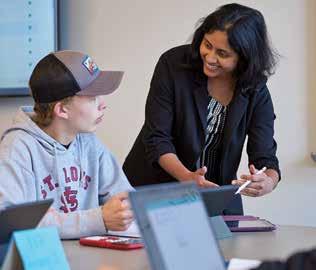
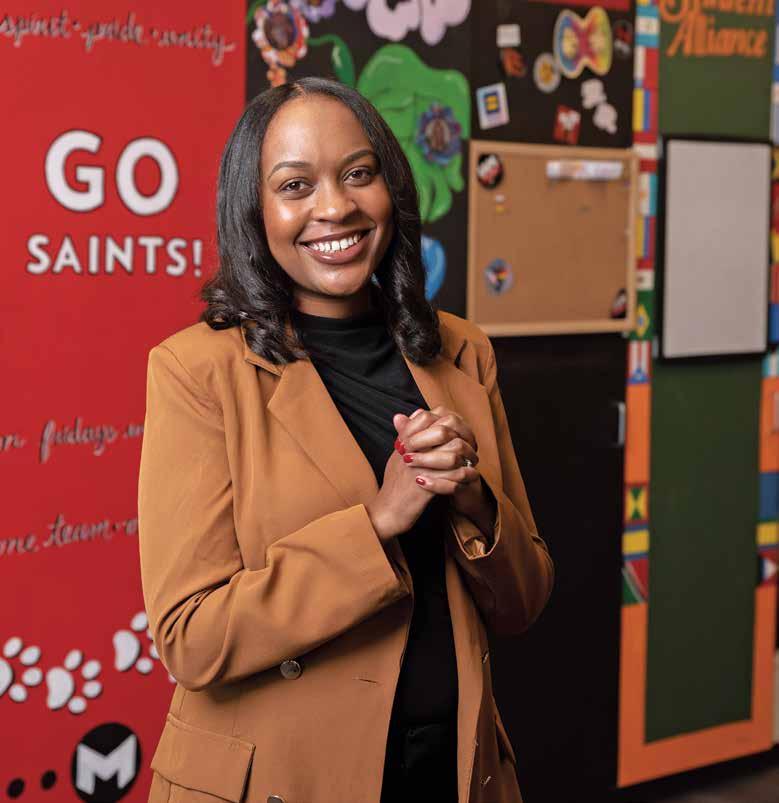
Maryville welcomes Renelle Spinks as the Director of the Office of Diversity and Inclusion. Spinks is passionate about empowering students to attain post-secondary success and reach their full potential. That begins with helping students find their voices.
What does it mean for a student to find their voice?
College is an important environment where students learn more about themselves and who they want to be. They learn how to be their authentic selves and how to show up authentically and confidently in different spaces. It’s important for students to learn how to advocate for themselves so they’re not afraid to speak up and share their opinions or ask questions. It’s also important that they learn how to advocate for others, especially people who are marginalized or oppressed and unable to advocate for themselves.
students want to see and what they’re not seeing. Maryville has done a lot of work in the diversity, equity and inclusion space, but how can we take it further? How can we shine a light on different areas that we’ve not done before to improve our campus community? For example, I’d really like to see a student conference around diversity, equity and inclusion.
What about the Maryville community stands out to you?
What do you hope to accomplish at Maryville?
Maryville’s Office of Diversity and Inclusion has a strong foundation with established student organizations representing many different cultural backgrounds. The fact that these groups exist at Maryville shows that our world has changed, but I’m a firm believer that there’s always room for improvement. I look forward to creating programs and events based on what our
I was drawn to Maryville because the University is leading the way when it comes to diversity, equity and inclusion. And our students are especially leading the way; they are innovative and breaking new ground every day in the areas of diversity and inclusion. When the students see a change is needed, the faculty and staff are committed to implementing those changes as quickly as possible. At another university, it may take longer for students to see the changes on campus they would like to see. Leadership at other universities may question how can they implement the change, and this can
cause a delay with initiating the change.
Sometimes when the change has eventually taken place, the students that originally voiced their opinions have already graduated and don’t get to see the fruits of their labor. Maryville has created a campus environment where students know their opinion matters. They know if they initiate the conversation and advocate for what they want, then change is possible.
Tell us more about your work around diversity and inclusion.
As an undergraduate student, I came to a new area where I didn’t know a lot of people. I sought out opportunities where I could interact with people who agreed with my ideas and opinions, but also opportunities to interact with people who didn’t agree with me or interpreted things differently than I would. I was grateful for the opportunity to step out and try new things and be involved with different student organizations. At Maryville, I’m excited to meet more students, faculty, staff and other community members and hear about their experiences.
I want every Maryville community member to feel accepted and valued. I want them to believe in themselves and know their voice matters.
Maryville soccer teams make history as the first GLVC school to win both the men’s and women’s soccer tournaments in the same year.
BY TIM FOX
Maryville University’s soccer program made history during the Fall 2022 season, when both the women’s and men’s teams advanced to the NCAA Division II (DII) tournament.
The women’s team, led by Coach Lori Lawson, achieved its first-ever Great Lakes Valley Conference (GLVC) victory to make its debut in the NCAA tournament. The team’s regular season was a success, too, with the women defeating a pair of top-25 teams on their way to an 11-2-6 record. And while the men’s 2022 appearance was their fifth consecutive NCAA DII tournament, they had to overcome some key injuries after enjoying their best season in coach David Korn’s seven-year history with the team. Working together, they prevailed with an 11-4-4 record going into the tournament.
At the NCAA tournament, the teams celebrated the men advancing to the Elite Eight with two wins and the women’s win over Northern Michigan. But in true Maryville fashion, both teams’ outstanding seasons were about community and academics as much as scoring goals. That winning combination points to a bright future for Maryville soccer, as players from around the world will continue to want to play for a university with faculty, fellow students and alumni who support the whole student-athlete — in a city with a brand-new soccer stadium and professional team.
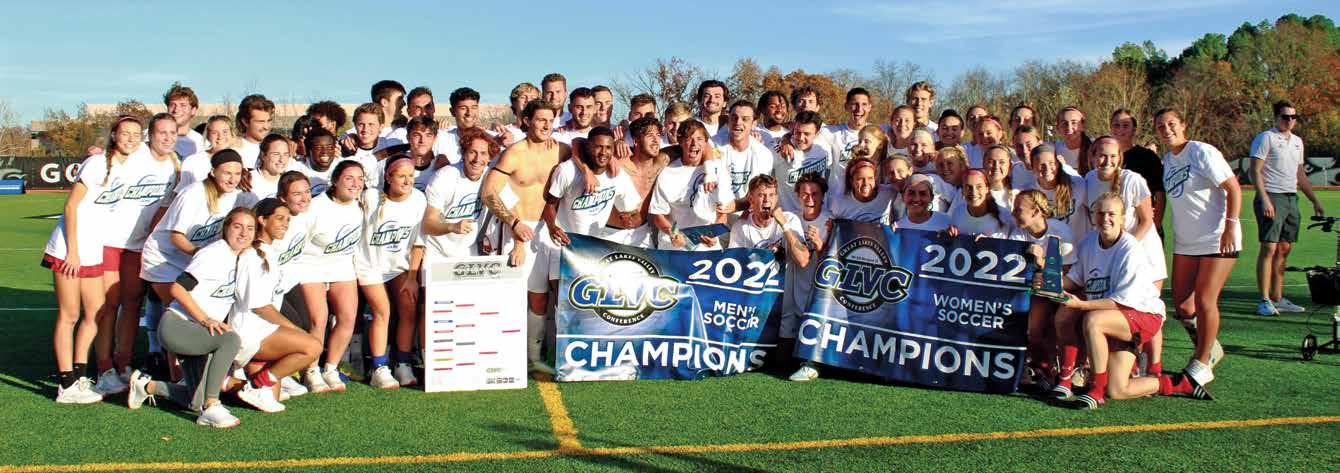
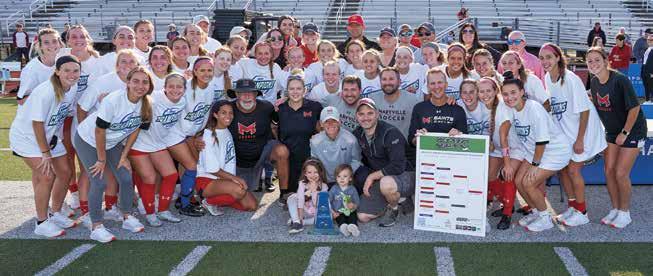
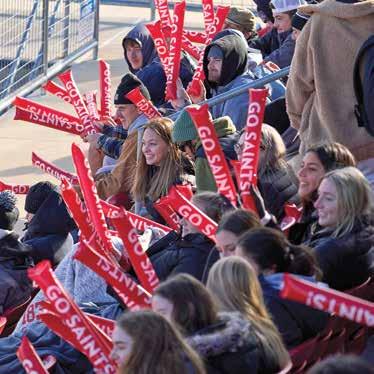
Experience the celebration!
Scan this code with your device camera.
The support that we had from everyone — especially our alumni — gave us the framework to build this year and get to where we got to be. We didn’t do this alone.
“Our players learned a lot last year, and they brought those lessons into this fall, instead of becoming discouraged,” coach Lori Lawson said. “That’s why we do this. Soccer is fun, but it also teaches of lot of life lessons.”
One of those lessons is how to work as a team.
As assistant women’s coach Eric Delabar put it, “Our players really fought together this season. They were always there for each other. I couldn’t be prouder of them.”
However, the Saints’ 2022 season was not without its challenges. A 0-0 tie with Drury University in early October set off a series of alternating ties and 1-0 wins for the Saints.
“We still found a way to get ties and wins, but we were lacking a little of the ‘extra touch’ we had earlier in the season,” Lawson said. But Lawson expected the lull, given Maryville’s focus on academic achievement. “It coincided with the players’ midterms,” she explained. And though all student-athletes struggle to balance athletic and academic performance, for the Saints, it’s all part of the experience.


“You have to keep it in perspective, getting your schoolwork done and then being fresh on the field,” said thirdyear student Lexi Gentry, the team’s top goal scorer and a biology major.
“But even when we travel, we study on the bus and find conference rooms or other places to do homework together.”
Team captain Kennedy Reeser, a midfielder studying physical therapy, said such shared experiences are what she loves about playing for Maryville.
“Our motto is food, fun and family,” Reeser said. “Everything we do revolves around that. It’s a community.”
Gentry said, however, that their community goes beyond the players.
“The support that we had from everyone — especially our alumni, who made videos supporting us before our conference championship and second NCAA match — gave us the framework to build this year and get to where we got to be,” she said. “We didn’t do this alone.”
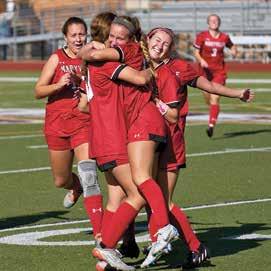
Unlike the women’s team, Maryville’s men fought through their tough spot early in the season. After their strong preseason, they opened the fall with a tough 2-1 loss against Saginaw Valley in Michigan, a nine-hour bus ride from St. Louis.
“We were playing one of the best teams in the region, and we were winning 1-0 early on, but we didn’t have our best game overall and ended up losing,” coach David Korn said.
After winning the next game, the team dropped two straight, but they never lost hope.
“We started out 1-3, which was the worst start that we’ve ever had since I’ve been at Maryville,” said Maryville center and fifth-year physical therapy student Andrew Schulz. “We had a meeting where everyone committed to the role they would play in getting us out of our slump. That helped bring us all together.”
For assistant men’s coach Derek Zuniga, those good relationships among the coaching staff and players give players lessons that will help them in soccer, in school and in life.
“We are transparent with them, support them


and motivate them to do the extra work,” Zuniga said. “This season, the group as a whole did whatever it took, whether it was showing up before training, practicing on their own time or getting together outside of practice to work on their game.”
Noting the team’s GPA over the last two years has ranged from 3.4 to 3.5, Korn said: “The connection between the field, classwork and the future all comes together. If your goal is to be a national champion or to get 100% on the next exam, you have to make your daily actions meet your ambitions.
“There’s so much going on in student-athletes’ lives that they don’t have a lot of wiggle room,” he continued. “They have to be structured, and we recruit for that. We want people who are self-motivated, not just in soccer but in other aspects of their lives, especially their studies.
“I feel spoiled to be at a university that supports athletes and values soccer as much as Maryville does,” Korn noted. “Whether it’s freshman orientation, alumni weekend or Homecoming, soccer is front and center.”
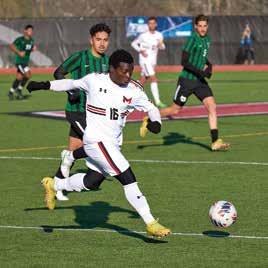
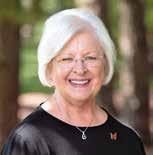
In 2009, Maryville University created the Lonnie Folks Award to honor former student-athletes, coaches or administrators who exemplify good spirit, sportsmanship, stewardship and service.
This year’s recipient of the Lonnie Folks Award is Kathy Lunan, past chief of staff and liaison to the board of trustees for Maryville’s Office of the President. Her distinguished Maryville career spanned across multiple presidents. During her 24 years of service at Maryville, Lunan was an avid supporter of Maryville student-athletes and a mainstay at athletic competitions. She worked with Maryville leadership in strategic planning efforts that included increasing the number of varsity sports teams, helping Maryville transition to NCAA Division II in 2009 and developing the property which is now the Athletic Complex. HIGHLIGHTS
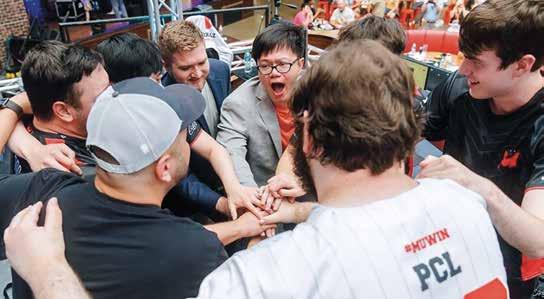
Maryville’s League of Legends Esports Team won the second annual Gateway Legends Collegiate Invitational, marking back-to-back hometown tournament titles.
This year’s Gateway Legends Collegiate Invitational brought together eight collegiate teams and eight high school teams competing in separate brackets for a chance to be crowned winners. Live gameplay took place inside Ballpark Village as part of a multiday Fourth of July celebration, hosted by Fair St. Louis.
“We were able to take decisive wins against our local rivals and beat the reigning national champions. Winning on St. Louis grounds is particularly meaningful for the team as we aim to grow Missouri into the top state for esports talent and development,” said Jensen Goh, head coach for Maryville’s League of Legends Esports Team.
Maryville started its tournament run on Friday with a main stage match against Harrisburg University in the quarterfinal portion of the bracket. That was a clean 2-0 win for the team. Moving on to Sunday, Maryville faced off against hometown rivals Saint Louis
University in the semifinals, which was another easy 2-0 sweep for the team.
The finals were a rematch of this year’s College League of Legends National Championship game against the University of St. Thomas (UST), which bested Maryville in the semifinals. This was very much a revenge match for the team. The finals started with UST taking the first two games against Maryville in the best-of-five series, but the Saints rallied together and continued to fight, taking the following three games and beating UST 3-2 in an insane reverse sweep.
“The weekend at Gateway Legends was fun for sure,” said Eain “APA” Stearns. “We knew we were going to be on the other side of the bracket to St. Thomas, so I was expecting a rematch in the finals and happy with the banger of a series that unfolded. I’m also happy with how my teammates played, and I think I stepped up and helped hold the team together throughout the series.”
Maryville men’s tennis player Mario Aleksic is a world-recognized tennis ace, and he’s on a mission to put Maryville’s tennis program on center court internationally.
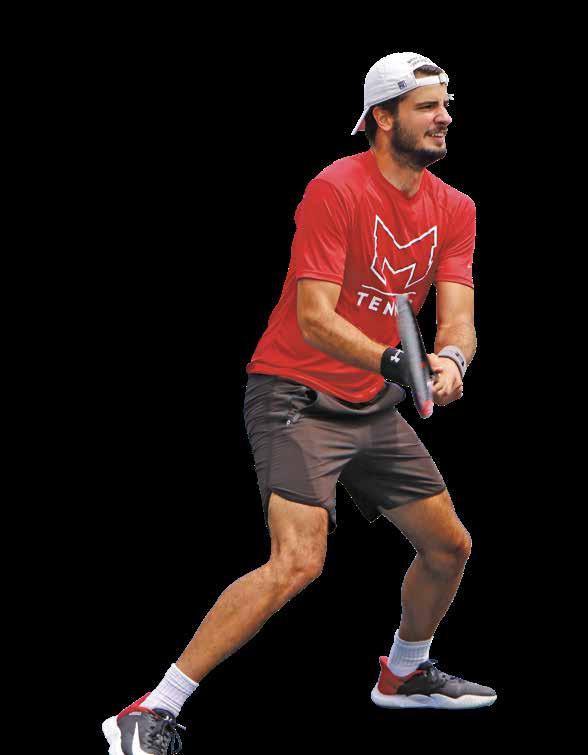
Mario Aleksic recently won the singles A Flight of the 2022 Intercollegiate Tennis Association Division II Midwest Regional Championship held in Indianapolis. The prestigious title is the first regional championship for the Saints in program history.
Following the win, Aleksic saw action in three matches at the ITA CUP in Mount Berry, Georgia. Unfortunately, he was forced to withdraw due to an injury. But he doesn’t plan on stopping his winning any time soon.
“I came here to try to take the Maryville tennis team to the next level,” Aleksic said. “My goal is to be the best player in the history of the program, and I want to contribute as much as I can to make the team better and to develop myself as a tennis player.”
A native of Montenegro, Aleksic began playing tennis when he was six years old. He started by playing in an exhibition league with his brother and quickly fell in love with the sport, going on to compete in Europe, Sweden, Belgrade and now the United States. Previously, he was part of Montenegro’s Davis Cup team, won a bronze medal in the Games of the Small States of Europe and even played for the Prince of Monaco.
So, how did he get to Maryville? “My brother played tennis at Maryville, too,” Aleksic explained.
“I had a lot of opportunities to play tennis in places like Florida and California, but speaking to coach David Reinhardt and my brother about Maryville made me want to come here. I’ve had no regrets.”
Still, he dreams of Maryville someday having tennis facilities large enough to host division matches. “Tennis is one of the biggest sports in the world, and if Maryville can develop its program more, the results will get better. I believe it will be good to grow tennis at Maryville.”
Aleksic will next be in action in the spring of 2023 to begin the NCAA Division II championship competition season.
Maryville signed an official partnership agreement with Under Armour, Inc., through BSN SPORTS, as the official athletic outfitter for all Saints programs. Starting July 1, 2022, the Saints were outfitted in Under Armour’s best-in-class performance footwear, apparel and equipment. “We’re thrilled for this wonderful partnership as we look toward the future,” said Director of Athletics and Recreation Lonnie Folks, ’82, ’98. “Both companies are the best partners to outfit Saints student-athletes, coaches and staff with elite athletic apparel. We’re looking forward to having our nearly 500 student-athletes represent Maryville University in Under Armour gear as we compete for conference and national championships.”
A new outdoor futsal court, an author shares tips and tools for mentors, and a provider adopts a trauma-informed approach to care.
Scott Brandt, ’85, of St. Louis, is owner of MotoExotica, a classic and exotic car business located in Fenton, Mo., which was recently featured in the St. Louis Business Journal. The article described Brandt’s path to selling classic and exotic cars, including how he pursued art from elementary school through graduate school. MotoExotica holds up to 250 cars in inventory on average at any time, selling 300 cars each year to customers around the world. Sales revenue was approximately $5 million in 2021, according to Brandt.
Jo Jasper Dean, ’85, of Chesterfield, Mo., was a featured artist at the Duane Reed Gallery Small Works Invitational Exhibition held from June 24–July 30, 2022. Dean was thrilled to be part of the exhibit, which was inspired by the wealth of talent working in the St. Louis regional area. Her unique painting style captures nature in exhilarating colors and has won her numerous spots in local, national and international group art shows.

John “Greg” Lorsbach, ’91, of Godfrey, Ill., a physical therapist with Alton Memorial Hospital’s Human Motion Institute, was named the 2021 Employee of the Year in a selection by hospital leadership from among last year’s 12 Employees of the Month. Throughout his career, Lorsbach has worked in a variety of settings including outpatient orthopedics and hospital-based outpatient and inpatient services. He has specialized in vestibular rehabilitation, outpatient orthopedics and acute inpatient rehabilitation. He said, “I am truly honored to receive this type of recognition. was really surprised, and who wouldn’t be? The only way that this type of honor was
ever attainable is related to all the people that I have working around me.”
Melissa “Missy” Bradford Klug, ’93, of Waltham, Mass., was appointed chief operating officer of Akari Therapeutics, Plc on July 1, 2022. Akari Therapeutics is a late-stage biotechnology company focused on developing advanced therapies for autoimmune and inflammatory diseases. In her new role, she will lead business development including finance and partnering strategies.
Kathleen “Kay” Quinn-Malone, ’99, of St. Louis, was named a 2021 Media Person of the Year by the St. Louis Press Club. The Media Person of the Year was established in 1988 to honor outstanding journalists
in the St. Louis area who have set new standards for professional ethics and achievement. The award recognizes Quinn-Malone’s more than 40 years in broadcasting and 33 years at KSDK-TV as a reporter and anchor.
Victoria Pines-Thomas, ’01, of Florissant, Mo., serves as an EPIC Applications Analyst in the information technology department at Washington University in St. Louis School of Medicine. Putting her Bachelor of Business Administration to good use, Pines-Thomas recently launched an online business specializing in personalized novelty items, including candles, T-shirts, mugs and home décor.
The Maryville University community mourns the loss of Melvin Reitzner. A professor of philosophy at Maryville for more than 50 years, Reitzner devoted his life to education and sharing his wealth of knowledge with students and faculty, family and friends.
Reitzner was exceptionally kind, giving, generous, patient and loving. Family was his No. 1 priority, especially his grandchildren. His quick-witted, playful and fun sense of humor made everyone feel comfortable and welcomed. He always had a sense of peace around him.
Reitzner is survived by his wife, Cynthia; his nine children; and many grandchildren.
Tim Sarlone, ’01, of Wentzville, Mo., is chief financial officer at Interim Physicians and now holds the additional title of chief operations officer. In addition to overseeing accounting and finance, he is responsible for the quality assurance and risk management teams as well as the travel department and human resources. Prior to joining Interim Physicians in 2009, Sarlone spent his career in public accounting and holds his CPA license in Missouri.
Benjamin W. Leacock, MD, FACEP, FAAEM, ’03, of St. Louis, is the new medical director of the Emergency Department at SSM Health St. Joseph Hospital — St. Charles Health Center. Leacock looks forward to maintaining high-reliability emergency services to the St. Charles community. He said, “This is a great hospital. Strong nursing staff, supportive leadership, consistently high patient satisfaction and clinically just a great place to work.” Leacock brings a wealth of expertise, including previously serving as Assistant Medical Director of the Emergency Department at Mercy Hospital South St. Louis and roles at SSM Health St. Mary’s Hospital.
Stella Viehland, ’04, ’10, of Catawissa, Mo., has served as assistant principal at Northwest High School since 2013 and was recently promoted to principal of the school. Northwest High School is her alma mater and where her teaching career first began. Viehland said she has “long dreamed of leading a school,” and heading up her alma mater makes her promotion even more meaningful. Prior to her roles at Northwest High School, she taught English and served as assistant principal at Lindbergh High School in St. Louis County.
Lisa L. Lockett, ’07, of St. Louis, joined Forest Park Forever as vice president of finance and treasury management.
Katherine Luner, MBA, MSW, LCSW, CCM, ’07, was promoted to client success executive with ProgenyHealth, LLC.
Christina Engle Shively, ’07, of Campbellsville, Ky., is an owner/ partner at Shively Law Office PLLC.
She is also vice president of the board of trustees of the Taylor County Library, a member of the community board of Hosparus Health and a member of the Taylor
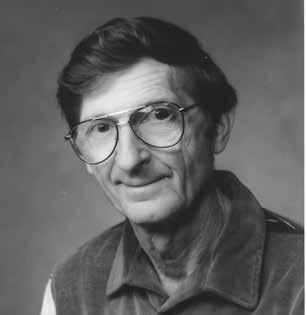
County Business and Professional Women’s Club.
Gretchen Morrison, ’10, ’15, of Grover, Mo., was appointed assistant principal of Keysor Elementary School in Kirkwood, Mo. Gretchen has been an educator for 18 years, serving students as a literacy coach, instructional coach, STEM instructor and classroom teacher. Most recently, she served as assistant principal at Heritage Primary Elementary in the Wentzville School District. “Morrison has a passion for literacy and equity, and is committed to building a sense of belonging and success for all students and staff,” said Keysor Principal Alyssa Taylor.
Derrick Wallace, EdD, ’10, was named assistant superintendent for student and community services for the Ladue School District. Wallace has served in the Ladue School District for the last 25 years in various positions with increased levels of responsibility. His most recent role was director of student services and Title IX
coordinator. He is a St. Louis native and graduate of Jennings High School. He holds a bachelor’s degree in Education from the University of Missouri-St. Louis, a master’s degree in Education Administration from Lindenwood University and a doctorate in Educational Leadership from Maryville University.
Cory L. Harlan, ’14, of Edwardsville, Ill., is the community director for the Cougar Village 400 Side student housing at Southern Illinois University Edwardsville.
1 Javyn O. Solomon, ’14, of St. Louis, worked alongside the Dutchtown neighborhood and St. Louis CITY SC on the opening of a new community futsal court at Marquette Park. This is the first outdoor futsal court in the City of St. Louis. The entirety of the court is covered by a mural designed by Solomon. The mural brings together elements of his artistic style, the soccer club and the Dutchtown neighborhood to create a dynamic and colorful experience for not only players on the court but also the whole neighborhood.
1935–2022
The Maryville community mourns the loss of Sister Mary Roch Rocklage, RSM, the modern-day foundress of Mercy’s health care system. She was known for her humble but tenacious leadership style — a blend of compassion, bold innovation and considering others before herself.
Rocklage helped lay the groundwork for a decades-long relationship between Maryville University and Mercy. In the 1970s, Maryville took on Mercy Junior College to create a college-based nursing program. Rocklage helped shepherd the partnership between Maryville and Mercy through its formative years.
In 2013, a generous grant from Mercy created The Catherine McAuley School of Nursing in the College of Health Professions. Today, the longtime partnership provides educational opportunities for Mercy employees, clinical rotations for Maryville students and more.


2 Breann “Bree” Baker Jones, ’15, ’20, and Dr. Garrett D. Jones, ’15, ’17, both of Georgetown, Texas, welcomed their daughter, Adelyn Avery, on July 30, 2022. Bree said, “We are enjoying each moment with our sweet baby girl and loving this new life as a family of three!”
Hannah Best, ’16, of San Diego, Calif., serves as a senior research associate with Janux Therapeutics. An experienced biochemist, Best is also currently pursuing a master’s degree in public health.
Blake Borders, FNP-BC, ’17, of Benton, Mo., joined Cape Cardiology Group, a Saint Francis Medical Partner, as a nurse practitioner. Borders has 10 years of nursing experience, specializing in cardiovascular, cardiothoracic, oncology, pediatrics and family practice. She received her Master of Science in Nursing from Maryville University in 2017.
Shawn Baker, EdD, ’17, of St. Louis, is vice president of student affairs and dean of student success at

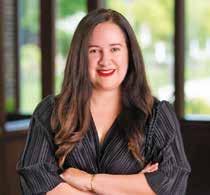
BY CONSTANCE GIBBS
Harris-Stowe State University. He is among 22 outstanding, senior-level higher education professionals selected by the American Association of State Colleges and Universities (AASCU) to participate in its 2022 Millennium Leadership Initiative (MLI). MLI is a premier leadership development program that provides individuals traditionally underrepresented in the highest ranks of post-secondary education with the opportunity to develop skills, gain a philosophical overview and build the network and knowledge needed to advance to the presidency. Baker holds a bachelor’s in pre-medicine and a Master of Education from Central Methodist University. He earned a doctorate in education in Higher Education Leadership from Maryville University.
Jill Lane, EdD, ’17, of Godfrey, Ill., retired from her role as chief academic officer at Lewis and Clark Community College. Lane served as chief academic officer since 2020. She previously served as dean of transfer programs from
2008–2021 and originally came to the college as an assistant professor of speech in 2004. Over the course of her career, she authored several publications, presented at numerous conferences and was involved in many community organizations.
Amanda C. Brueggeman, ’18, of Wentzville, Mo., announced the publication of her book, Student-Centered Mentoring: Keeping Students at the Heart of New Teachers’ Learning The purpose of the book is to provide specific student-centered strategies, tips and tools for mentors to utilize while partnering with new teachers to propel student learning. She said, “It’s because of my doctoral research that led me to create this idea, and am excited to give back to the education community. By empowering others, my hope is to impact students’ learning in a broader way through my work.”
Bailey Olson Lane, ’18, and Jackson P. Lane, ’17, both of Kansas City, Mo., married in 2020. The couple welcomed a baby boy, Elijah Grant, on March 7, 2022.
Maya A. Solomon, ’18, of Champaign, Ill., joined University of Illinois’ women’s basketball
team as director of operations in April 2022. Solomon is a Saints women’s basketball alumna and former team captain who also received the program’s Senior Award in 2018, graduating with a Bachelor of Science in Sport Business Management.
Shelby Whaley, ’18, of Edwards, Calif., serves as an environmental scientist at Edwards Air Force Base.
3 Deanna Deterding, ’19, of St. Louis, announced she finished a master’s degree at Southern Illinois University Edwardsville in May 2020 after previously completing a Bachelor of Science in Environmental Science at Maryville. Deterding recently accepted a position as a habitat restoration technician at Litzsinger Road Ecology Center, a 39-acre study center helping teachers engage their students in place-based education using local ecology as a framework. Deterding became interested in restoring native habitats while she was researching plant and pollinator relationships at Shaw Nature Reserve during her undergraduate studies at Maryville. At Litzsinger Road Ecology Center, she works to remove invasive species to support a thriving natural community for students and educators to learn from.
Nikki LaBruyere Mamuric, ’00, has been on a fast-track since receiving her bachelor’s degree from Maryville. After earning an MBA from Washington University in St. Louis, she moved into key marketing positions with Procter & Gamble, Church & Dwight and L’Oréal.
Along the way she earned a reputation as a strategic thinker with expertise in building a variety of brands. Now, she serves as the director of new platform development at Sargento Foods Inc., where she recently received two top marketing honors.
First, Mamuric and her team received a 2022 Bronze REGGIE Award in Partnership Marketing for the launch of Balanced Breaks Cheese & Crackers, which is on track to become the biggest, most successful launch in Sargento’s 68-year history. The launch campaign leveraged a custom beatbox track to tune out competitors and tune in millennials to the latest snacking innovation from their favorite cheese and cracker brands. Since 1983, the REGGIE Awards have been the premier marketing awards program, recognizing the best brand activation marketing campaigns activated by brands and agencies. The name REGGIE was originally chosen because it symbolizes results by “making the cash register ring” with consumers.
Second, Mamuric was chosen as a 2022 Adweek Executive Mentee, where she and a group of selected program participants will receive 1:1 guidance from leading C-suite members. The program is designed to help advance diversity, equity and inclusion in the C-suite by uplifting qualified, diverse talent through personalized advisement and guidance from accomplished leaders. This year’s mentors include more than 150 of the world’s top chief marketing officers from some of the most well-known, industry-leading Fortune 500 companies.
“I am humbled and honored to be part of this talented group of marketers who are dedicated to growth and development, and I am thankful to Adweek for giving me this amazing opportunity,” Mamuric said.
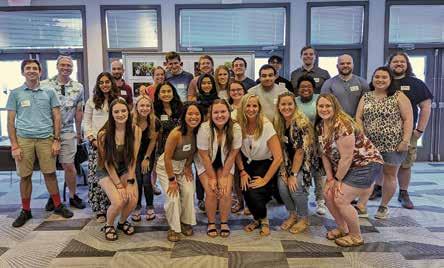
4
Shawnna Johnson, ’19, of Brainerd, Minn., serves as an advanced practice registered nurse and certified nurse practitioner at the Essentia Health St. Joseph’sBaxter Clinic. Johnson received her education from Maryville University and is certified by the Pediatric Nursing Certification Board. She said, “I have been a registered nurse at Essentia for nearly 20 years before I started my new role as a pediatric nurse practitioner. I am very excited to continue my career here in a setting that I love and a community I’m proud to call home.”
Melissa Knopik, ’19, of Brainerd, Minn., has furthered her education to become an advanced practice registered nurse and certified nurse practitioner specializing in pediatrics at the Essentia Health St. Joseph’s-Baxter Clinic. Knopik received her Master of Science in Nursing from Maryville in 2019 and is certified in pediatrics by the Pediatric Nursing Certification Board.
Jeremy Mapp, EdD, ’19, of St. Louis, was unanimously approved by the Kirkwood School District Board of Education to serve as the executive director of diversity, equity and inclusion.
Mapp previously served as director of inclusion, equity and diversity for Lindbergh Schools and was the former assistant principal of Keysor Elementary School in the Kirkwood School District, where he led the socialemotional learning work for students and staff with a priority on building relationships. His additional experience as a former elementary and middle school teacher and a house parent at Joe’s Place, a house for homeless teenage boys in the MaplewoodRichmond Heights School District, gives him a perspective on supporting students of diverse backgrounds. Mapp received a doctorate in education in Educational Leadership from Maryville University.
Rebecca “Becky” Lehrer Peterson, ’19, of Detroit Lakes, Minn., joined Sanford Health in Detroit Lakes as a certified nurse practitioner.
Lindsay Wright, ’19, of Fenton, Mo., serves as a Research Specialist II at Bayer Crop Science. Wright is excited to announce that she is returning to Maryville to pursue an MBA.
4 On Saturday, August 6, 2022, a group of alumni gathered on
the Maryville University campus at Buder Family Student Commons to celebrate 10 years of the “Krakos Lab.” The group consisted of alumni who participated in research projects hosted by Kyra Krakos, PhD, associate professor of biology, during their undergraduate studies at Maryville. More than 30 people attended festivities throughout the evening. The reunion included a pizza dinner and ice cream treats while attendees enjoyed a photo display featuring the last 10 years. Attendees reminisced about memories made during their time in the program doing research and on trips presenting that research at national conferences, including a group of students who presented this past summer in Alaska. Additionally, alumni shared updates on their postgraduation journeys, and Krakos reflected how students have made a tremendous impact on her life over the past decade.
Emily Barnes, EdD, ’20, of Brighton, Mich., joined Siena Heights University as provost and vice president of academic affairs. Prior to this role, Barnes served as the eleventh president (interim) of Cleary University in Howell, Michigan, and was the university’s first woman provost and first woman interim president. She is known as the academic thought-leader behind “The Cleary Mind,” which is described as a “new, unparalleled business arts educational approach.” Barnes earned her doctorate in education in Higher Education Leadership from Maryville University.
Juliaetta “Nichole” Bratton, ’20, of Poplar Bluff, Mo., joined Saint Francis Healthcare System as a pediatric nurse practitioner in the Urgent Care at Saint Francis Clinic Poplar Bluff.
5 Hannah Kobe Byers, ’20, of Washington, Mo., graduated with a Bachelor of Science in Nursing from Maryville. Shortly after graduation, Byers married her best friend on September 12, 2021. She’s happy to report that, “We welcomed another member to the family this year. Mila Mae was born May 19, 2022. We are overjoyed to continue growing our family!”
Katelyn Cornell, ’20, of O’Fallon, Ill., started a new job at HSHS St. Elizabeth’s Hospital in the newborn nursery. Her boyfriend, Robert, also started a new job at Boeing in St. Louis. In May, while on a date to celebrate receiving their dream jobs, Robert proposed. The couple has been together for five years and looks forward to getting married.
hospice, serving that community since 1981. A trusted name in their community, they are people who care and are dedicated to helping those with terminal illnesses and their families live each day to the fullest. Phelps attended Maryville University and earned her Master of Science in Nursing in 2020, and she is certified by the American Association of Nurse Practitioners (AANP), which is the largest and only full-service national professional membership organization for NPs of all specialties.
Arren E. Romeril, ’20, of Defiance, Mo., accepted a position as a life coach at Maryville University in the Division for Student Success.
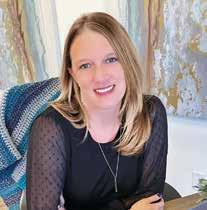
BY NANCY FOWLER
In her new book, Clementine Gets UNSTUCK, Jen Monika McCurdy, ’00, introduces readers to a third grader with a busy mind. As Clementine wrestles with decisions from what to wear to which playground activities to participate in, she finds her way to a helpful wellness exercise.

Amy Featherston, MSN, APRN, FNP-C, ’20, of Cape Girardeau, Mo., has joined Immediate Convenient Care in Cape Girardeau, a medical partner of Saint Francis Healthcare System. Featherston, who has more than 10 years of health care experience, received her undergraduate degree in nursing from Southeast Missouri State University and her master’s degree from Maryville University.
Rebecca Girresch, ’20, of St. Louis, graduated with a Master of Science in Biology from Maryville. A proud alumna of the Krakos Research Lab, Girresch earned the “Outstanding Teaching Award” in the graduate program. Since then, she’s integrated her Maryville research experiences into her high school Advanced Placement Biology class.
Brandi Phelps, ’20, of Ringling, Okla., is an advanced practice registered nurse currently serving her patients at Cross Timbers Hospice in Ardmore, Oklahoma. Cross Timbers Hospice is South Central Oklahoma’s only nonprofit 5
Kristen Sparks, ’20, of St. Louis, has signed with the Memphis Americans of the National Indoor Soccer League. Sparks played forward for Maryville University from 2016–2020, where she was a four-time academic All-American. She also spent time with the Women’s Premier Soccer League’s St. Louis Lions from 2018–2019.
Bobbie Buseth, ’21, of Minot, N.D., joined Trinity Health Riverside outpatient behavioral health staff as a psychiatric mental health nurse practitioner.
Elise Kraus, PMHNP-BC, ’21, of Townshend, Vt., completed her clinical rotations at Grace Cottage Family Health and Dartmouth Hitchcock Medical Center and has joined the Grace Cottage medical team as a nurse practitioner, providing trauma-informed and LGTBQIA+ focused care. Kraus has more than 20 years of experience in health care, most recently working as an HIV nurse clinician for Dartmouth Health and as an RN for Planned Parenthood, Vermont Department of Corrections and Maplewood Nursing Home of Cheshire County, New Hampshire.
“A lot of us have big thoughts and internal chatter that doesn’t stop,” McCurdy said. “Clementine learns how to use belly breaths — a kind of meditation — to calm down so she can make decisions.” McCurdy, a mental health therapist, wrote Clementine with therapist Christine Corrigan Mendez, who taught as an adjunct professor at Maryville. The book is linked to the authors’ KidsCanClub.com website. McCurdy designed the website, which helps kids form their own wellness clubs with the assistance of parents, teachers and counselors. The site also offers additional resources such as meditations, puzzles and coloring pages. Feedback from the book and website has been very positive. Parents, teachers and counselors report many children have learned how to take time out for themselves to figure out what to do when they feel bombarded. “We’re hearing things like, ‘If Clementine can do it, I can do it,’” McCurdy said. McCurdy’s therapy practice focuses on fertility, pregnancy and postpartum. She began pursuing a master’s in counseling following her experience with postpartum anxiety after the birth of her first child. Her healing journey informs her work with clients as well as her writing work.
The project demonstrates how closely wellness and art are tied, McCurdy said. “Art is so connected to our thought processes,” she said. “When I was at Maryville, we were encouraged to try different ways of being creative, and to take risks. learned how to ask for help, to brainstorm and keep going.”
Clementine is the first in a series of books focused on mindfulness for kids. Ideas for subsequent books include strategies to help them overcome a fear of animals. Future plans also include taking Clementine directly to schools. McCurdy wants to share the experience of getting a book published, a process that was more involved and timeconsuming than the authors had thought. McCurdy hopes their success story will inspire children to launch and follow through on their own creative ideas.
Virginia McDannald, ’50
Ann Dames, 56
Mary Virginia Klohr Krebs, ‘56
Jane Shannon Cannon, ’57
Judith Sherman, ’79
Louise Ershen, ’80
Robert S. Kuntzman, ’83
Judith Jo Ann Nanninga Kramer, ’85
Barbara Ann O’Connell, ’89
Rita Wilson, ’90
Patricia Gutmann, ’94
Kevin Holt, ’95
Calvert Ambrose Jared II, ’95
Timothy Harper, ’13, ’16
Carolyn E. Samuelson, ’18
Heidi Leimkuehler, FNP-C, ’21, of Brunswick, Mo., joined Carroll County Memorial Hospital as a family nurse practitioner. Leimkuehler looks forward to the opportunity to provide quality health care locally. She enjoys practicing medicine because of the ability to learn something new and provide patient-centered care. Her medical interests include family medicine and oncology. Leimkuehler’s personal interests include anything outdoors, and she loves to watch baseball and travel with her family. She received her Master of Science in Nursing from Maryville.
Kara A. Page, AGACNP-BC, ’21, of Cape Girardeau, Mo., accepted an Acute Care Nurse Practitioner position with the hospitalists at Saint Francis Medical Center. Page earned her Bachelor of Science in Nursing from Southeast Missouri State University, followed by her Master
of Science in Nursing from Maryville University. Previously, she was a registered nurse in the Progressive Care Unit at Saint Francis.
Gabrielle “Gabby” Williams Plummer, FNP, ’21, of Farmington, Mo., joined Medical Arts Convenient Care as its newest provider. Plummer is a boardcertified nurse practitioner specializing in family medicine. She earned her nursing degree from Maryville University and most recently spent six years as a registered nurse in the medical-surgical unit at Parkland Health Center.
Daniel Hannon, ’22, of O’Fallon, Mo., was promoted to interim principal at Robert T. Geggie Elementary School in the Rockwood School District. Hannon previously served as assistant principal at the school.
Alexis Shanks, ’22, of Jacksonville, Ill., started a job as an election security intelligence analyst for the Illinois State Board of Elections. After completing her cybersecurity degree, she was looking for the perfect job to launch her career and is pleased to announce that the new role is it! She said, “I’m so glad I was able to get the degree I did because I truly believe it set me out as a strong candidate for security analyst positions.”
Stephanie Stock, ’22, of Belleville, Ill., announced the publication of her book, Be Marvelous. The book is a compelling, authentic and inspiring work aimed at sharing truth about mental illness, including sharing her own experience with obsessivecompulsive disorder and anxiety, and helping to end the negative stigma around mental illness.

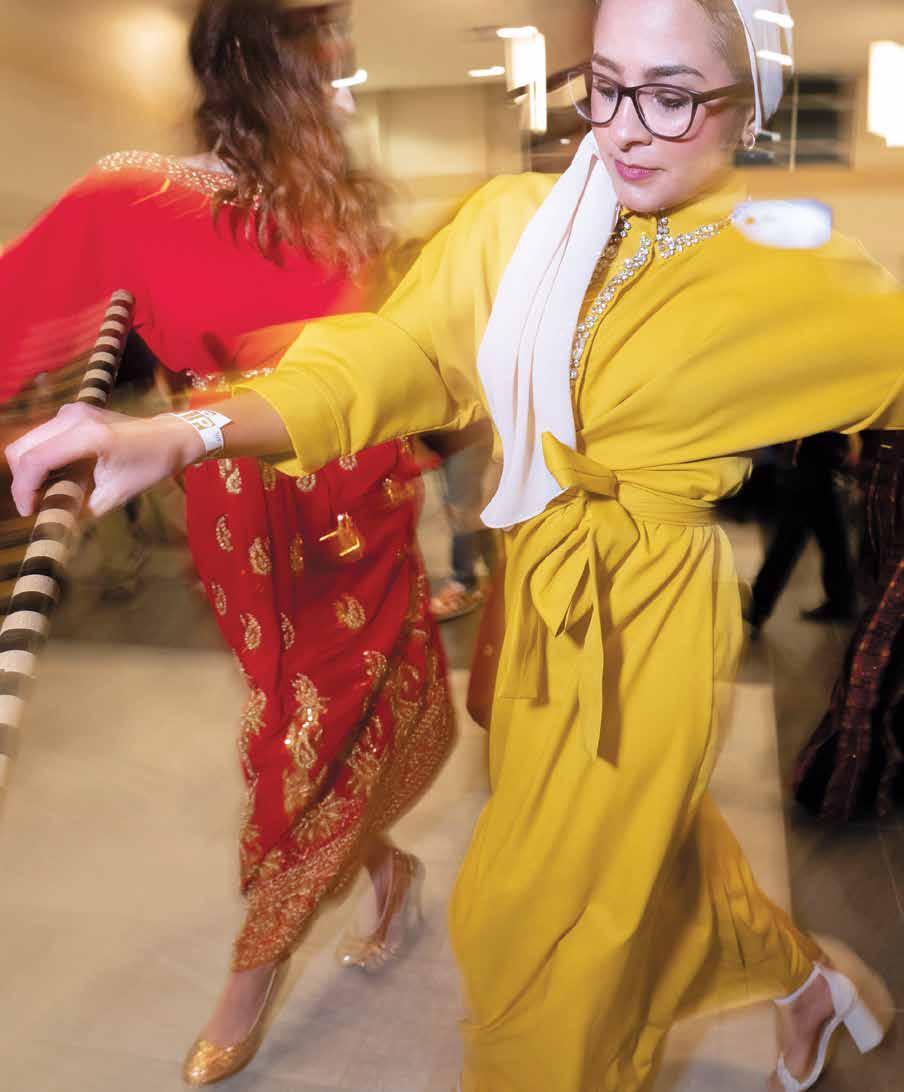
ARABIAN NIGHT: The Maryville community was invited to learn about Arab culture at Arabian Night, hosted by the Middle Eastern Student Association. The evening featured a live performance by Al Salam Dabke, a group putting a contemporary spin on the dabke, a traditional line dance. Led by its spirited drummers, students and guests got up on their feet and joined hands to transform Gander Dining Hall into a large dance party.